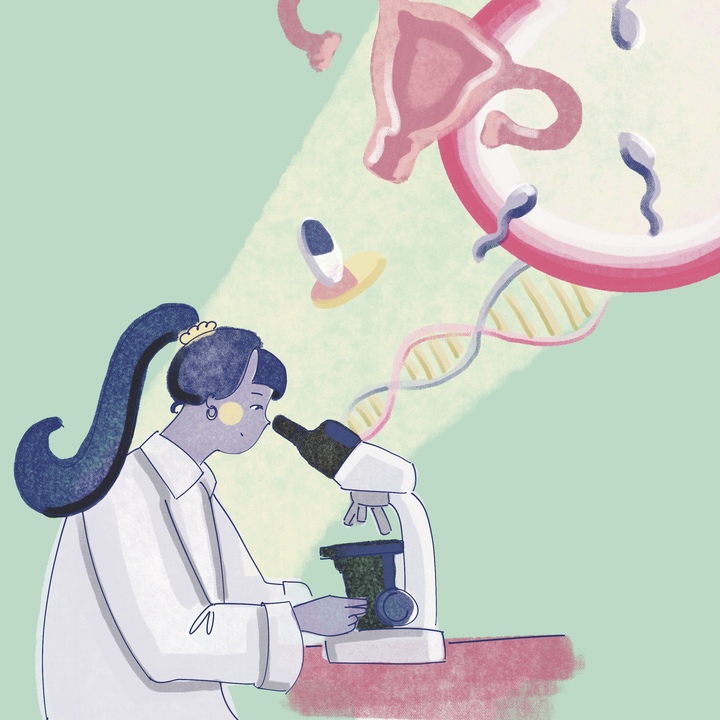News
WashU launches new master’s program in Reproductive Health Sciences

(Annie Tian | Contributing Illustrator)
WashU will offer a new master’s program in Reproductive Sciences starting next year to fill what its leaders see as a gap in reproductive health education. The program aims to teach the biology of reproduction, fetal development, and menopausal aging to students interested in clinical health, reproductive health research, and reproductive policy.
The program, which is accepting applications until Dec. 30 for its 2025 cohort, is one of only a few master’s programs in reproductive health nationwide.
Erin Reinl, Ph.D, an instructor in the Department of Obstetrics & Gynecology at WashU’s School of Medicine, will serve as program director. Reinl said the Department of Obstetrics & Gynecology launched the program after a tangible need for more highly-trained researchers.
“It’s been hard to find people to fill our research positions that have a background in reproductive sciences,” Reinl said. “It’s not a common research area. There are a lot of people interested in reproductive biology, but there just aren’t avenues to pursue that interest.”
Reinl noted the lack of attention from educational institutions and the scientific community on this field of research has been a long-standing problem.
She said that is, in part, due to the fact that people view reproductive health as a women-centered field and don’t understand its broader relevance. She added that the public understanding of reproductive health is limited mostly to the conception and birth of a child, but that its scope is much more complex.
“The ovary, for example, does more than just produce eggs to make a baby,” Reinl said. “It produces a lot of hormones that are so important for our overall health.”
The master’s program is designed to fit a broad range of careers, including people who plan to attend medical school, those interested in research or working in pharmaceuticals, and the growing sector of femtech —- which is technology that addresses women’s health needs.
Sarah England, Ph.D, Director of the Center for Reproductive Health Sciences at WashU, said that the program has been in the works for six years, though faculty in the School of Medicine have been eager to launch it for nearly 13 years.
She said that WashU already had strong reproductive health education within its medical school, but there was a need for more intentional education focused on research in the field.
“We are so strong in reproductive sciences,” England said. “Our department was ranked seventh in NIH [National Institutes of Health] funding in 2023, but we don’t actually have didactic courses in this topic, so we just thought [creating the master’s program] was really important.”
As part of the program, students will develop a broad base of knowledge in reproduction and women’s health. They will also participate in rotations through research laboratories that work on various reproductive fields, such as sperm biology, and perform their own research that culminates in a thesis on their chosen field of study.
“I’m envisioning that [the master’s students] could study really any aspect of what we offer here on campus, in our department,” England said. “If they are interested in the early part of pregnancy, if they’re interested in non-pregnant people and want to study endometriosis, if they want to study menopause. There are so many ways that they could study the reproductive systems.”
Students in the program will also take a communications course that aims to bridge reproductive biology with practical and professional needs.
“It’s so important in any career, science or not, to be able to take your knowledge and explain it to other people,” Reinl said. “These students will be able to communicate with their colleagues, with other students, with people who have no biology background at all. That skill is important in a job environment, but it’s also so important that more people are able to speak openly and comprehensively about reproductive biology.”
The program will also create new courses on reproductive health topics that undergraduate students can enroll in. Reinl said she hopes to see increased collaboration across schools, between undergraduates, master’s students, and Ph.D students studying reproductive health.
Reinl said the program aims not only to better inform its students about reproductive health topics, but also to address broader misconceptions and gaps in understanding in this field.
“Having more people understand reproductive biology is beneficial for society because reproductive health is human health,” Reinl said. “This will be good for St. Louis and everywhere.”
